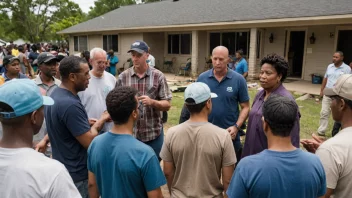The growing emphasis on mental health initiatives is reshaping community perceptions and establishing a culture of understanding and support. Historically, mental health issues have been shrouded in stigma, often leading to isolation and misunderstanding. However, with increased awareness and proactive measures, communities are beginning to recognize the significance of mental wellbeing as a vital aspect of public health. By exploring various initiatives and their impact, we can see how mental health awareness is gradually transforming societal attitudes.
One notable initiative is the implementation of mental health first aid training in various organizations. This program trains individuals to recognize the signs of mental health struggles and provides them with the tools to support their peers effectively. By equipping community members with this knowledge, organizations foster an environment of awareness and compassion. The training demystifies mental health issues, encouraging open discussions and reducing the stigma often associated with them.
Schools are also taking a proactive approach to mental health by integrating social-emotional learning into their curricula. This initiative aims to equip students with essential skills to manage their emotions, establish healthy relationships, and make responsible decisions. As children learn about mental health from a young age, they grow up with an understanding of its importance, ultimately leading to a generation that values mental wellbeing. This educational shift not only benefits students but also extends to families and communities, creating a ripple effect of awareness and support.
Local governments are recognizing the need to incorporate mental health services into their public health agendas. Initiatives such as community mental health days, where resources and information are made accessible to the public, are gaining traction. These events often include workshops, counseling sessions, and discussions led by mental health professionals. By bringing mental health services directly to the community, individuals are more likely to seek help and engage in conversations about their mental wellbeing.
Moreover, storytelling plays a pivotal role in changing community perceptions. Platforms that encourage individuals to share their personal mental health journeys foster empathy and understanding. Documentaries, podcasts, and blogs that feature real-life experiences help to humanize mental health struggles and demonstrate that they are common challenges faced by many. Such narratives remind communities that mental health is an integral part of the human experience, thus encouraging more supportive and inclusive environments.
The intersection of mental health and social justice is another critical area of focus. Advocates highlight the disproportionate impact of mental health issues on marginalized communities, emphasizing the need for equitable access to mental health resources. Initiatives that specifically target these communities are essential to address systemic barriers and promote mental wellbeing for all. By advocating for comprehensive services and support systems, communities can work towards dismantling the structures that perpetuate mental health disparities.
In conclusion, the transformation of community perceptions regarding mental health is a collective effort that requires the involvement of individuals, organizations, and governments. As initiatives gain momentum, it is crucial for community members to engage, educate, and advocate for mental health awareness. By supporting mental health initiatives and participating in discussions, individuals can help shape a society that prioritizes mental wellbeing. Each action taken contributes to a more compassionate world where everyone feels valued and supported in their mental health journey.
Mental Health Initiatives Changing Community Perceptions
Explore how mental health initiatives are reshaping community perceptions and fostering a culture of understanding and support.






